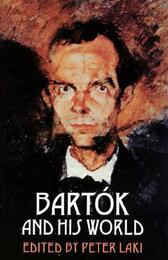
|
Bartok and His World
Paperback / softback
Main Details
| Title |
Bartok and His World
|
| Authors and Contributors |
Edited by Peter Laki
|
| Series | The Bard Music Festival |
|---|
| Physical Properties |
| Format:Paperback / softback | | Pages:250 | | Dimensions(mm): Height 254,Width 197 |
|
| Category/Genre | 20th century and contemporary classical music
Bands, groups and musicians |
|---|
| ISBN/Barcode |
9780691006338
|
| Classifications | Dewey:780.92 |
|---|
| Audience | | Professional & Vocational | | Tertiary Education (US: College) | |
|---|
| Illustrations |
6 halftones, 13 music exs.
|
|
Publishing Details |
| Publisher |
Princeton University Press
|
| Imprint |
Princeton University Press
|
| Publication Date |
27 August 1995 |
| Publication Country |
United States
|
Description
Bela Bartok, who died in New York fifty years ago, is one of the most frequently performed 20th-century composers. He is also the subject of a rapidly growing critical and analytical literature. Bartok was born in Hungary and made his home there for all but his last five years, when he resided in the United States. As a result, many aspects of his life and work have been accessible only to readers of Hungarian. The main goal of this volume is to provide English-speaking audiences with new insights into the life and reception of this musician, especially in Hungary. Part I begins with an essay by Leon Botstein that places Bartok in a large historical and cultural context. Laszlo Somfai reports on the catalogue of Bartok's works that is currently in progress. Peter Laki shows the extremes of the composer's reception in Hungary, while Tibor Tallian surveys the often mixed reviews from the American years. The essays of Carl Leafstedt and Vera Lampert deal with his librettists Bela Balazs and Melchior Lengyel respectively. David Schneider addresses the artistic relationship between Bartok and Stravinsky. Most of the letters and interviews in Part II concern Bartok's travels and emigrati
Author Biography
Peter Laki is a musicologist serving as program annotator for the Cleveland Orchestra.
Reviews"Adds important material to the slim library of English-language studies of Bartok's achievements."--The New York Times
|